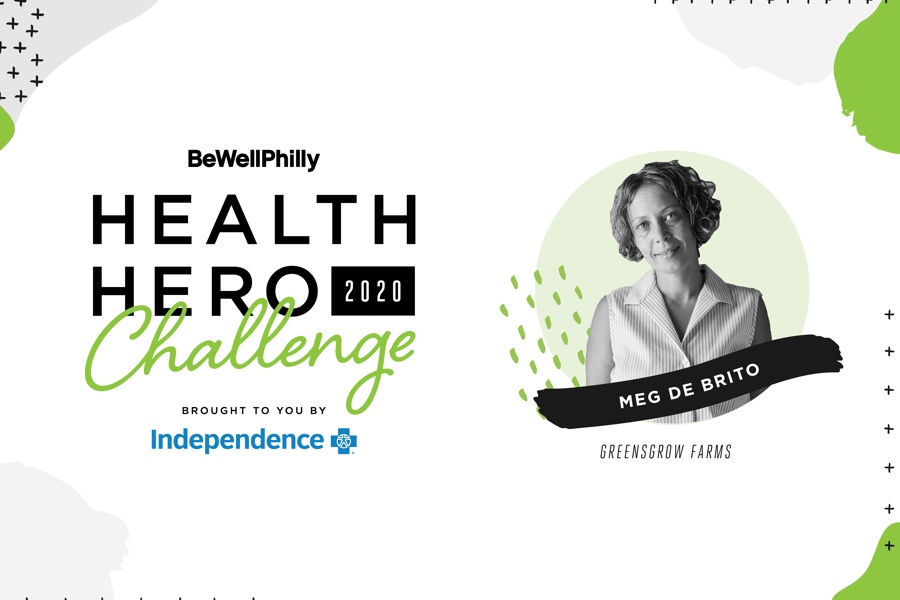This Urban Farm Director Wants Philly to Prioritize Food Access and Green Space
Meet Meg DeBrito, one of our 2020 Health Hero semi-finalists.

Meg DeBrito is one of our 2020 Health Hero semi-finalists. | Photo provided, design by Meredith Getzfread.
Over the next few weeks, we’ll be chatting with our semi-finalists in the 2020 Be Well Philly Health Hero Challenge brought to you by Independence Blue Cross to give you a glimpse of the people who are helping Philadelphians live healthier lives. Vote to help decide which of these 10 semi-finalists become one of three finalists in the running to be our 2020 Health Hero — and get a sizable donation to a charity of their choice — here. Remember, you can vote once a day until October 1st!
Name: Meg DeBrito (@megdebrito), executive director at Greensgrow Farms (@greensgrow)
Nonprofit of choice: Greensgrow Farms is a nationally recognized leader in urban farming and a nonprofit dedicated to promoting social wellness through community green space. Greensgrow reconnects city dwellers with rural food producers and promoting the greening of Philadelphia’s homes and gardens, and cultivates social entrepreneurship and community greening in Philadelphia neighborhoods.
***
What motivates you to try and make Philadelphia a healthier place?
I believe that personal health and wellbeing comes from meaningful connection to our environment. Our health is insular, not stable and permanent — instead it is the fluid reality that we take part in daily through our decisions and interactions. Health is the manifestation of connection that aligns itself with the natural world. The COVID-19 crisis has shown us how connected each of us are to one another. I believe this is the moment to shift the depth of perspective in Philadelphia to imagine a shared collective health that prioritizes access to ecology, food, and landscapes that help us each relate with more peaceful possibility in our shared environment. I believe that when we are civically prioritizing the health of our shared environment through planting, growing food, tending vacant land, or prepping some flower boxes outside of our house, we are curating the civic space to make room for more individual health.
Describe a health or fitness related turning point in your life.
I grew up in a household riddled with alcoholism and fairly normal food values. I left home to study design, which was not a straight path into a university. I had to work immensely hard to earn an architecture degree. In the process I was so stressed, under-nourished, and relying on the same addictive patterns I had grown up around. In my final year of university my immune system started to flare up in ways that were uncontrollable with typical medical intervention. This followed me into my professional life working for design firms out of college. A few years in, I threw in the towel on office life and move to an agro-forestry farm in Mexico. It changed my relationship to life and to my own body. It was here that I started to bend my design career to focus on the landscape, which led me into a better relationship with food, movement, exercise and healthier life patterns. I found healing through watching the natural world heal itself. I returned to Philadelphia and began engaging tin building local food resources and promoting environmental agriculture policy messages with design.
What policy would you institute to make Greater Philadelphia a healthier region?
It would be twofold. I would suggest we offer all 415 farms and gardens in Philadelphia an opportunity to become part of the Neighborhood Gardens Trust to make sure that we preserve green space that has been in many neighborhoods for generations, when the land was undervalued by civic government structures. Many neighborhoods now depend on small farms and gardens for community engagement and meaningful green space allowing for shade, cooling, peaceful interaction and learning about plants.
I would look to the city to help resource more urban farms so that they can grow into stable entities. We subsidize large-scale architecture through our farm bills, in many cases these subsidies are for corn, soy, and sugar — crops that take a lot of space, cause toll on the soil and are bad for our bodies. If local governments started prioritizing nutrient-dense food growers and small-scale agricultural entities we would see increased possibility come out of the all the urban growing spaces that are tended to in the city. So many farms do huge things in communities, but do not have enough resources to scale up. We should prioritize land and land practices to lead the way to health in our communities.
What’s the most important part of your health or wellness regimen?
Eat simply and move consistently. I keep myself well and the communities I care for well when I nourish myself with simple, whole ingredients — especially in the summer and fall it’s easy to choose fresh food and eat it with minimal preparation. Practices to stay nourished and choose foods that keep energy balanced are hugely important in our lives. I have a lot of energy, so I make sure that I balance my sedentary activities with physical activities, whether on the farm, biking my son to school or the running trail. I make sure to get at least an hour of exercise daily.
What is your number one piece of health-related advice?
Accept your whole self, and modify into what feels like perfect alignment for you. There is no singular way to find health in the body — when we learn to accept our whole self in our whole environment, we can learn to see and hear more clearly between our internal need and our external reality. This helps us align our inside with our surroundings; it is this alignment in connection that is the basis for health.
Check out all the Health Hero semi-finalists, and remember to vote HERE now. (Remember, you can vote once a day until October 1st!) Stay in touch with @bewellphilly and @phillymagevents and be sure to follow the challenge using #BWPHealthHero!


